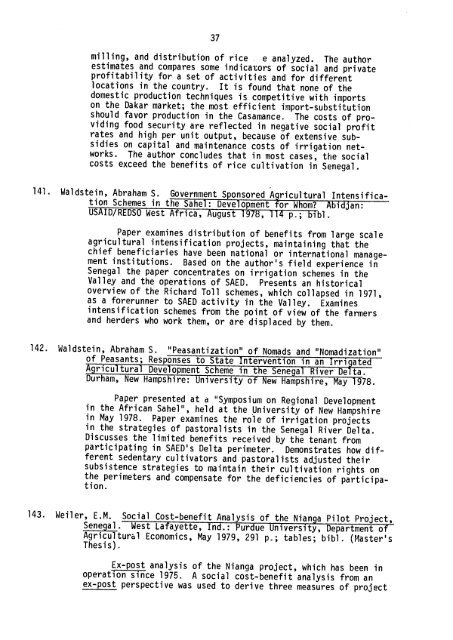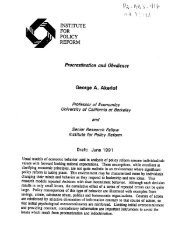SO 0\C)V'lQ " -- - usaid/ofda
SO 0\C)V'lQ " -- - usaid/ofda
SO 0\C)V'lQ " -- - usaid/ofda
Create successful ePaper yourself
Turn your PDF publications into a flip-book with our unique Google optimized e-Paper software.
37<br />
milling, and distribution of rice . e analyzed. The author<br />
estimates and compares some indicators of social and private<br />
profitability for a set of activities and for different<br />
locations in the country. It is found that none of the<br />
domestic production techniques is competitive with imports<br />
on the Dakar market; the most efficient import-substitution<br />
should favor production in the Casamance. The costs of providing<br />
food security are reflected in negative social profit<br />
rates and high per unit output, because of extensive subsidies<br />
on capital and maintenance costs of irrigation networks.<br />
The author concludes that in most cases, the social<br />
costs exceed the benefits of rice cultivation in Senegal.<br />
141. Waldstein, Abraham S. Government Sponsored Agricultural Intensification<br />
Schemes in the Sahel: Development for Whom? Abidjan:<br />
USAID/RED<strong>SO</strong> West Africa, August 1978, 114 p.; bibl.<br />
Paper examines distribution of benefits from large scale<br />
agricultural intensification projects, maintaining that the<br />
chief beneficiaries have been national or international management<br />
institutions. Based on the author's field experience in<br />
Senegal the paper concentrates on irrigation schemes in the<br />
Valley and the operations of SAED. Presents an historical<br />
overview of the Richard Toll schemes, which collapsed in 1971,<br />
as a forerunner to SAED activity in the Valley. Examines<br />
intensification schemes from the point of view of the farmers<br />
and herders who work them, or are displaced by them.<br />
142. Waldstein, Abraham S. "Peasantization" of Nomads and "Nomadization"<br />
of Peasants; Responses to State Intervention in an Irrigated<br />
Agricultural Development Scheme in the Senegal River Delta.<br />
Durham, New Hampshire: University of New Hampshire, May 1978.<br />
Paper presented at a "Symposium on Regional Development<br />
in the African Sahel", held at the University of New Hampshire<br />
in May 1978. Paper examines the role of irrigation projects<br />
in the strategies of pastoralists in the Senegal River Delta.<br />
Discusses the limited benefits received by the tenant from<br />
participating in SAED's Delta perimeter. Demonstrates how different<br />
sedentary cultivators and pastoralists adjusted their<br />
subsistence strategies to maintain their cultivation rights on<br />
the perimeters and compensate for the deficiencies of participation.<br />
143. Weiler, E.M. Social Cost-benefit Analysis of the Nianga Pilot Project,<br />
Senegal. West Lafayette, Ind.: Purdue University, Department of<br />
Agricultural Economics, May 1979, 291 p.; tables; bibl. (Master's<br />
Thesis).<br />
Ex-post analysis of the Nianga project, which has been in<br />
operation since 1975. A social cost-benefit analysis from an<br />
ex-post perspective was used to derive three measures of project

















